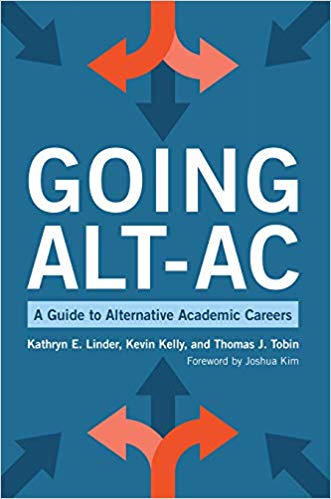You have /5 articles left.
Sign up for a free account or log in.
 The authors of Going Alt-Ac: A Guide to Alternative Academic Careers, Kathryn E. Linder, Kevin Kelly and Thomas J. Tobin, asked me to write the foreword to their book. That was a great honor.
The authors of Going Alt-Ac: A Guide to Alternative Academic Careers, Kathryn E. Linder, Kevin Kelly and Thomas J. Tobin, asked me to write the foreword to their book. That was a great honor.
In an effort to inspire you to join the conversation about alternative academic careers, and to support the scholarship of the authors, the publisher of Going Alt-Ac has generously agreed to allow me to share the foreword in this space. As a bonus, you can save 20 percent on the book with code GALTAC when you order directly from Stylus Publishing.
Foreword
Going Alt-Ac is a book that will change lives. If that sounds like too strong an endorsement, then you are not one of us trying to navigate an alternative academic career. If Going Alt-Ac had been available 20 years ago, as I began my own post-Ph.D. nontraditional academic journey, then I think the book would have saved me from years of career angst. Among the many beautiful things that Going Alt-Ac accomplishes is to give those of us pursuing nonlinear post-Ph.D. paths the understanding that we are not alone. That our choices to pursue something outside of a faculty role are legitimate. And that it is okay, even maybe universal, for those in alternative academic gigs to feel as if we are making up our careers as we go.
The main message of Going Alt-Ac is that one need not follow a traditional faculty path to have a rewarding and impactful academic career. As this book explains, for many Ph.D.s, an alternative academic career will be the best choice. How might a life of alternative academia possibly be preferable to the tenure track? The world of nontraditional academic careers combines many of the best things about being a professor with the benefits of life outside of academia. An alt-ac gig means trading the life of a super subspecialist for that of a generalist. Alternative academics work with partners from every discipline. Where in many academic disciplines the scholarship on which career advancement depends can be solitary (particularly in the humanities), alternative academic careers are collaborative by nature. Alt-acs work mostly in teams.
Although those on the nontraditional, nontenure, academic track will often continue to produce scholarship, they tend to do so in different ways. Without the demand to publish in only peer-reviewed journals or university presses, alternative academics are perhaps more free than traditional faculty to integrate their scholarship with public outreach and engagement. Going Alt-Ac takes the reader step-by-step through how early career alternative academics can build up their professional reputations and communities of practice through engaging in professional associations, social media and consulting. These are all activities that are valued by the broader alternative academic community and that offer creative platforms for professional growth.
Another gift of Going Alt-Ac, both for those of us in our second decade of a nontraditional academic career and for those who may be just starting down this path, is the book’s avoidance of happy talk. As the authors recognize and discuss, alternative academic careers can be immensely rewarding, but they are seldom easy. Those of us on the outside of the well-worn faculty path often find ourselves on the margins of our institutions. Going Alt-Ac does a terrific job of capturing the liminal nature of nontraditional academic careers. Existing somewhere between staff and faculty, alt-acs operate in the gray areas of the academy. The simple act of filling out the “occupation” section of a form is a challenge for alt-acs: there is no job category that starts with “alternative.”
The authors produced a book that anyone contemplating, or negotiating, a nontraditional academic career will want to read. Readers will want to not only read but also workshop and teach and book club and share. When I was growing up, my parents were part of a loose counterculture of vegetarian academics. I remember a defining feature of this subgroup was how all of these alternative food people seemed to own a dog-eared copy of The Moosewood Cookbook. First self-published in 1974 by Mollie Katzen, The Moosewood Cookbook went on to inspire a generation of new vegetarians, while giving those who had already given up meat one of the first reliable and accessible guides to cooking delicious food. I suspect that Going Alt-Ac will be the Moosewood for this generation’s growing number of nontraditional academics. I think that we will keep Going Alt-Ac on our desks, as both a reference guide and a reminder that we are part of something bigger. We will give the book to our advisers and faculty colleagues. When our partners and our parents and our friends ask what we do for a living, we will answer confidently that we are “going alt-ac.”








